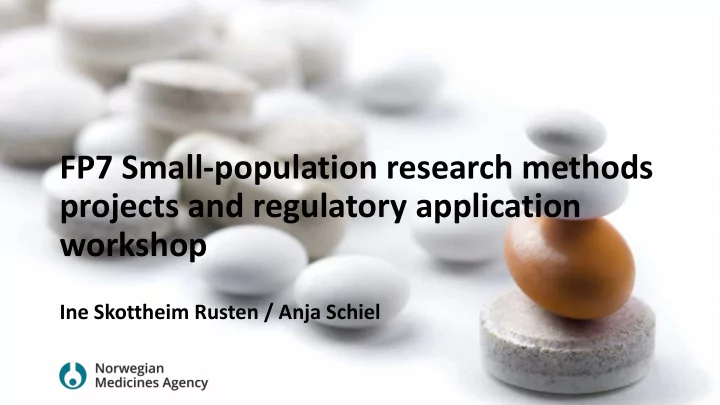

FP7 Small-population research methods projects and regulatory application workshop Ine Skottheim Rusten / Anja Schiel
Disclaimer The views and opinions expressed in this presentation are the author's own and do not necessarily reflect the official position of the European Medicines Agency or the Norwegian Medicines Agency.
RCT, the golden standard? • We are aware of the shortcomings of the randomized clinical trial. • Still, it has it’s role and purpose, we just need to understand that ‘one size doesn’t fit all’ • What alternatives are on offer? • What requirements do we have -> how much less can we accept? -> how can we learn more and to better benefit for the individual patient? • Do we need all the answers straight away? • What if we know it’ll never get ‘good enough’?
Are you alone? • No, also in other areas the quest for alternative study designs, that better answer the true questions is on. • What is needed is a change in all stakeholders (regulators, HTA’s, payers, scientists, clinicians and patients) perception on what is required for decision making • Dosing rationale • B/R • Cost-effectiveness / Added benefit • Sustainability • Do we always need the full Monty -> probably not • Is our problem more the ‘ unmet scientific need ’ that has to be satisfied rather than the lack of sufficient data?
Knowledge modeling (sub)-Atom Disease/Diagnosis Disease Organism Predictive patophysiology Predictive physiology • • Multi-omics Efficient Drug discovery developments (sub)-Cells Foundation for extrapolation Enable personalized, predictive Learning phases and preventive medicine Tissues 0-II Drug Organs Predictive pharmacology Confirming • phases III Individual(s) Post-approval Population
Our existing and emerging data sources Chemical & physical properties Social media Genomics Phenomics Claims In vitro studies databases Transcriptomics Environmental mHealth records factors Non clinical Structural studies biology eHealth records Surveys Proteomics Fluxomics Imaging PKPD studies Environmental Litterature Metabolomics data Integrated sensors Lifestyle RCTs Registries data In silico modeling
A learning system We need Precompetitive core knowledge models per therapeutic area for • Models/ planning, systematic learning and supporting extrapolation Simulations predictive physiology • predictive pathophysiology (patogens) • predictive pharmacology • Data science underpinning -> in target populations -> in special populations - Development plan Systems learning - Extrapolation plan Model repositories • Access to acceptable methodological tools for • study design (repositories?) Dynamic validation To get there Precompetitive collaborative initiatives (public/private) • Registries with sufficient data collection to inform disease models • Benchmarking approaches to validation/qualification of models • Modular approaches • Decision criteria Improved approaches to handling uncertainty • Accept criteria Regulatory compliant in silico trial frameworks • • Failure regions •
Find partners, strength in number of scientists • Decision making in the presence of uncertainty is the bread and butter of several stakeholders including HTA’s and regulators. • Risk is not the same for different stakeholders • Certainty is not the same for different stakeholders • ‘ Good enough ’ is not in everybody's vocabulary • Proof can be established in time, it isn’t by definition a one time event • Agreement on a process that accumulates evidence to confirm assumptions/models with appropriate exit strategies is the way forward
Life cycle approach • Define the decision points; what needs to be demonstrated in order to move forwards (in or out of adaptive licensing mind-set) • Consortiums per therapeutic areas to facilitate efficient management of patients, data and knowledge -> particularly needed for the small population areas, but would even be beneficial for the larger ones • Widen your perspective -> a good compromise leaves everybody slightly disappointed but allows all to move forward.
Scope of the workshop • Discuss methodology • What is the current status on • The rational behind the need for better designs • Identification of characteristic of optimal designs • How can we optimize data generation by use of modelling • Will this improve decision making processes • Stakeholders input on acceptability of methods and models • Development of methods and establishing an information network • Start understanding the needs of the other stakeholders and work to find solutions that are acceptable to all.
Recommend
More recommend